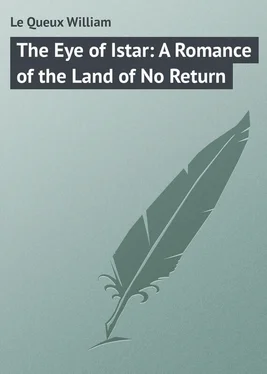William Le Queux - The Eye of Istar - A Romance of the Land of No Return
Здесь есть возможность читать онлайн «William Le Queux - The Eye of Istar - A Romance of the Land of No Return» — ознакомительный отрывок электронной книги совершенно бесплатно, а после прочтения отрывка купить полную версию. В некоторых случаях можно слушать аудио, скачать через торрент в формате fb2 и присутствует краткое содержание. Жанр: Прочие приключения, foreign_prose, на английском языке. Описание произведения, (предисловие) а так же отзывы посетителей доступны на портале библиотеки ЛибКат.
- Название:The Eye of Istar: A Romance of the Land of No Return
- Автор:
- Жанр:
- Год:неизвестен
- ISBN:нет данных
- Рейтинг книги:5 / 5. Голосов: 1
-
Избранное:Добавить в избранное
- Отзывы:
-
Ваша оценка:
- 100
- 1
- 2
- 3
- 4
- 5
The Eye of Istar: A Romance of the Land of No Return: краткое содержание, описание и аннотация
Предлагаем к чтению аннотацию, описание, краткое содержание или предисловие (зависит от того, что написал сам автор книги «The Eye of Istar: A Romance of the Land of No Return»). Если вы не нашли необходимую информацию о книге — напишите в комментариях, мы постараемся отыскать её.
The Eye of Istar: A Romance of the Land of No Return — читать онлайн ознакомительный отрывок
Ниже представлен текст книги, разбитый по страницам. Система сохранения места последней прочитанной страницы, позволяет с удобством читать онлайн бесплатно книгу «The Eye of Istar: A Romance of the Land of No Return», без необходимости каждый раз заново искать на чём Вы остановились. Поставьте закладку, и сможете в любой момент перейти на страницу, на которой закончили чтение.
Интервал:
Закладка:
Pressing my hand with lingering tenderness, she said, —
“Thy words give peace unto me, O Zafar. Henceforth shall I rest in the knowledge that the man who is my friend is prepared to risk his life on my behalf.”
“Yea,” I answered; adding, “of a verity this meeting between enemies hath been a strange one. Hast thou not warned thy father of the approach of the hosts of the Khalifa?”
“Even on the same night as thine encampment was destroyed warning was conveyed unto him, with the result that our troops have been sent forward into the desert with the object of checking the advance of thy tribesmen.”
“They are not my clansmen,” I answered, quickly. “I am an Arab, a native of the Aures, the mountains far north beyond the Great Desert.”
“Then thou art not a Dervish?” she exclaimed, gladly.
“No,” I answered, and at the same moment remembering that the Khalifa’s troops numbered many thousands, and that it was scarcely likely that they would be turned aside in their onward march by a few squadrons of the Sultan of Sokoto, I asked, —
“Have the horsemen of the Black Standard been routed?”
“I know not. Yesterday I overheard the messengers delivering their report to the Sultan in the Hall of Audience,” she replied.
“But if they are still advancing! Think what terrible fate awaiteth thee if the soldiers of the Khalifa loot this thy beautiful palace, and spread death and desolation through thy city with fire and sword!”
“Arrangements have already been made for my secret escape. In case of danger I shall assume thy garments, arms and shield, which I have preserved, and pass as a Dervish.”
“Excellent,” I said, laughing at her ingenuity. “But let us hope that my comrades will never gain these walls. If they do, it will, alas! be an evil day for Kano.”
“The detection and slaughter of thy scouts placed our army upon its guard,” she said. “Already the defences of our city have been strengthened, and every man is under arms. If the Dervishes attack us, of a verity will they meet with an opposition long and strenuous, for by our fighting-men the walls of Kano are believed to be impregnable. See!” she added, drawing aside a portion of the silken hangings close to her, and disclosing a small window covered with a quaintly-worked wooden lattice. “Yonder our men are watching. Our principal city gate, the Kofa-n-Dakaina, is strongly guarded by night and day.”
Chapter Four
The Mark of the Asps
Stepping to the window, I found that the apartment in which we stood was evidently situated in a tower of the palace – which I had heard was built high on Mount Dala – for the great city, with its white, flat-roofed houses and cupolas, and minarets of mosques, lay stretched beneath us. At the massive gate, in the high frowning walls which surrounded the extensive and wealthy capital of the Empire of Sokoto, the far-famed entrepôt of Central Africa, soldiers, attired in bright uniforms of blue and gold, swarmed like flies, while cannon bristled on the walls, and everywhere spears and arms glittered in the sun. She pointed out the Jakara, a wide, deep lake, the great Slave Market crowded with buyers, sellers and human merchandise, the Palace of Ghaladima and the Kofa Mazuger. The city was agog, for the hum of life rose from its crowded streets and busy market-places, mingling now and then with the ominous roll of the war drums, the twanging of ginkris , the clashing of cymbals, and the shouts of the eager, ever-watchful troops. By the cloudless, milk-white sky I knew it was about noon, and the sun directly overhead poured down mercilessly upon the immense sandy plain which stretched away eastward and northward until it was lost in the misty haze of the distant horizon. Date palms rose in small clusters near the ornamental lake in the centre of the city; in the square spreading alleluba-trees cast their welcome shade, and beautiful gotuias unfolded their large, featherlike leaves above slender and undivided stems, but beyond the city walls there was not a tree, not a blade of grass, not a living thing. Out there all was sun, sand and silence.
“Dost thou reside here always?” I asked, as together we gazed down upon the great white city.
“Yes. Seldom are we in Sokoto itself, for of later years its prosperity hath declined, and the palace is of meagre proportions; indeed, it is now half-ruined and almost deserted. The wealth and industry of the empire is centred here in Kano, for our trade extendeth as far north as Mourkouk, Ghat, and even Tripoli; to the west, not only to Timbuktu, but even to the shores of the great sea; to the east, all over Bornu; and to the south, among the Igbira, the Igbo, and among the pagans and ivory hunters of the Congo.”
“True,” I said, gazing round upon the prosperous capital of one of the most interesting empires in the world. “It is scarcely surprising that my ambitious lord, the Khalifa, should desire to annex the land of the Sultan ’Othman. Even our own cities of Omdurman or Khartoum are not of such extent. How many persons inhabit this, thy palace?”
“In this, the Great Fada, nearly three thousand men and women reside. In the harem alone are four hundred women and six hundred slaves and eunuchs, while the Imperial bodyguard numbers nearly a thousand.”
Glancing below, I saw the palace was enclosed by white walls as high and strong as the outer fortifications. It was built within the great Kasba or fortress, a veritable city within a city.
Turning, our eyes met, and pointing to the distant, sun-baked wilderness, I exclaimed, —
“Away there, the vultures would already have stripped my bones hadst thou not taken compassion upon me.”
“Speak not again of that,” she answered. “Thou wert the only man in whose body the spark of life still burned. It was my duty to rescue thee,” she replied, rather evasively.
“Now that we understand and trust each other, now indeed, that we are friends true and faithful, wilt thou not tell me why thou didst convey me hither unto thine apartment?”
She hesitated, gazing away towards the misty line where sky and desert joined, until suddenly she turned, and looking boldly into my face with her clear, trusting eyes, answered, —
“It was in consequence of something that was revealed.”
“By whom?”
“By thee.”
“What revelation have I made?” I asked, sorely puzzled.
She held her breath, her fingers twitched with nervous excitement, and the colour left her cheeks. She seemed striving to preserve some strange secret, yet, at the same time, half inclined to render me the explanation I sought.
“The astounding truth became unveiled unconsciously,” she said.
“My mind faileth to follow the meanderings of thy words,” I said. “What truth?”
“Behold!” she cried, and hitching the slim fingers of both her hands in the bodice of cream flimsy silk she wore beneath her zouave, she tore it asunder disclosing, not without a blush of modesty, her white chest.
“Behold!” she cried, hoarsely. “What dost thou recognise?”
With both her hands she held the torn garment apart, and, as she did so, my eyes became riveted in abject amazement. Bending, I examined it closely, assuring myself that I was not dreaming.
“Hast thou never seen its counterpart?” she asked, panting breathlessly.
“Yea,” I answered, with bated breath. “Of a verity the coincidence astoundeth me.”
The sight caused me to marvel greatly; I was bewildered, for it conjured up a thought that was horrible. In the exact centre of her delicate chest, immediately above her heaving bosom, was a strange, dark red mark of curious shape, deeply branded into the white flesh, as if at some time or other it had been seared by a red-hot iron. The paleness of the flesh and the firm contour of her bosom rendered the indelible mark the more hideous, but its position and its shape dumbfounded me. The strange blemish constituted an inexplicable mystery.
Читать дальшеИнтервал:
Закладка:
Похожие книги на «The Eye of Istar: A Romance of the Land of No Return»
Представляем Вашему вниманию похожие книги на «The Eye of Istar: A Romance of the Land of No Return» списком для выбора. Мы отобрали схожую по названию и смыслу литературу в надежде предоставить читателям больше вариантов отыскать новые, интересные, ещё непрочитанные произведения.
Обсуждение, отзывы о книге «The Eye of Istar: A Romance of the Land of No Return» и просто собственные мнения читателей. Оставьте ваши комментарии, напишите, что Вы думаете о произведении, его смысле или главных героях. Укажите что конкретно понравилось, а что нет, и почему Вы так считаете.












